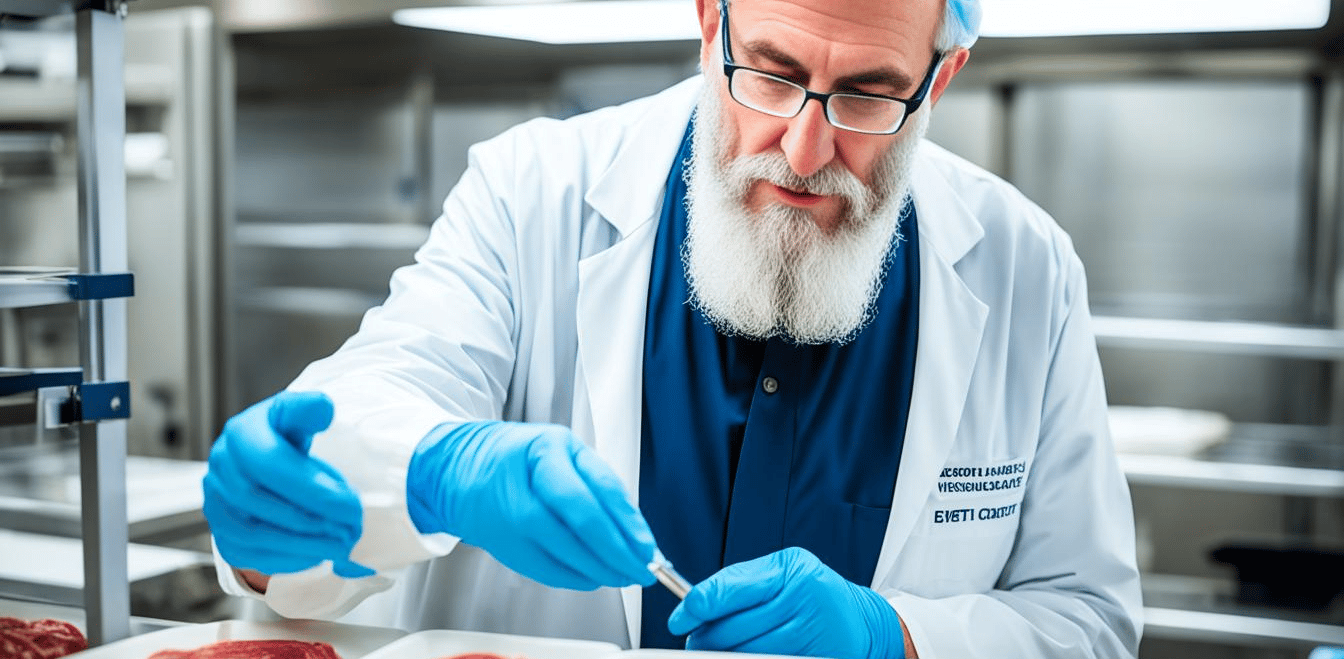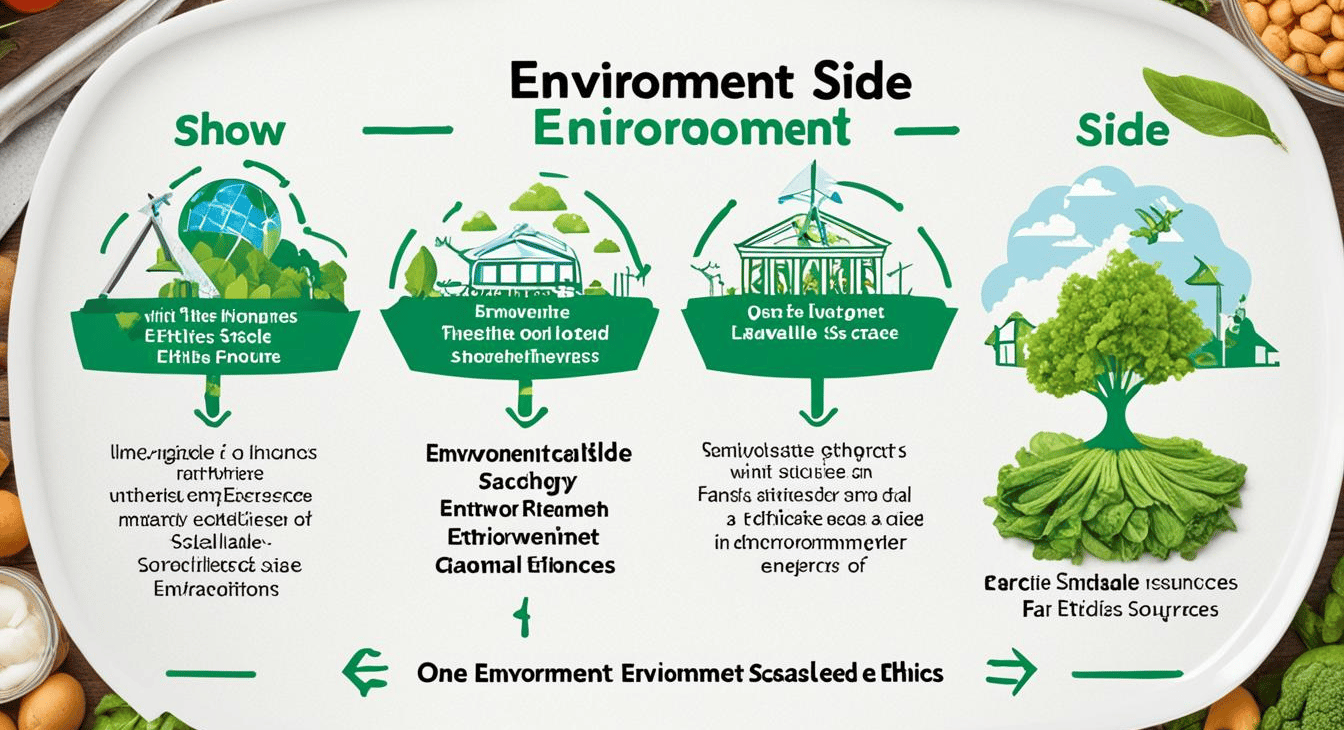Koco Kosher Blog # 1 Kosher Veganism, Lab-Grown Kosher Meat
Explore the intersection of kosher food with veganism, lab-grown meat, and ethical dietary choices, and understand how these trends shape modern kosher practices.
In 2013, a breakthrough was made in creating the first lab-grown beef patty. Mark Post of Maastricht University led this effort. This innovation opened doors to a future where eating ethically is possible and practical.
Today, about 60 startups are working hard to improve and sell these new meats. This includes everything from beef to exotic kangaroo. SuperMeat, a leader in this area, has even gotten kosher certification from the Orthodox Union Kosher. This could change how we eat for centuries to come.
In the U.S., more people are choosing plant-based kosher foods. Lab-grown meats are also gaining attention for their promise of a slaughter-free future. GOOD Meat and UPSIDE Foods are leading this new industry, thanks to the USDA's approval for their cell-cultured poultry.
These new products are changing the game for those following kosher food laws. But vegans might find themselves questioning where these meats fit in. Since they come from animal cells, they blur the lines between traditional and plant-based diets. This brings up big questions about our food choices and values.
Key Takeaways
Lab-grown meat represents a convergence of technology and tradition, fundamentally altering the doctrine of kosher food.
Ethical eating and sustainability are principal drivers in the acceptance of cultivated meats within kosher dietary law.
Sustainable kosher options are expanding, with pioneering companies like SuperMeat introducing kosher certification for lab-grown meat.
Plant-based kosher diets continue to thrive, yet the distinction between animal-based and lab-grown meats sparks debate among ethical eaters.
The success of lab-grown meats hinges on consumer acceptance, which is currently testing the waters of this nascent innovation.
Through groundbreaking advancements, kosher lab-grown meat contends to significantly reduce environmental impact compared to traditional livestock farming.
The Intersection of Kosher Food and Veganism
The mix of kosher diet and veganism is changing how we think about food. It blends traditional and modern eating habits. To understand this, we look at what each practice stands for and how they work together.
Understanding Kosher Dietary Laws and Vegan Principles
Kosher dietary laws come from Jewish tradition. They tell us what foods to eat, how to prepare them, and how to process them. Veganism, on the other hand, doesn't allow any animal products or byproducts. It's based on ethical considerations like animal welfare and the environment. Combining these diets is hard because food must follow strict kosher rules and vegan ethics.
To learn more, people can check out Mipikale's FAQ on kosher and vegan.
Plant-Based Kosher: Merging Dietary Guidelines with Vegan Ethics
More people want kosher and vegan food, so companies are making it. Plant-based kosher products show how to mix kosher certification with vegan values. This helps those who follow kosher laws and vegans alike.
Thanks to food technology, companies can make products that fit these strict standards. These products are good in quality and taste. This mix is why plant-based kosher foods are getting popular, showing that dietary and ethical considerations can work together.
The table below shows how kosher and vegan diets compare, focusing on where they match and where they don't:
Kosher Diet AspectsVegan Diet PrinciplesCombined Approach in Plant-Based KosherProhibition of certain animals and meticulous slaughter methodsAvoidance of all animal productsUse of alternative plant-based ingredients approved by kosher authoritiesSeparation of dairy and meat productsNo dairy or meat products usedSeamless compliance as vegan products naturally exclude dairy and meatRequirement for specific preparation processesEmphasis on cruelty-free and minimally processed foodsDevelopment of processing methods that honor both kosher certification and vegan ethics
This blend of kosher diet and veganism meets dietary and ethical considerations. It also promotes sustainable eating worldwide. It shows a shift towards eating with care, blending tradition with modern ethics for a better diet.
Introduction to Lab-Grown Kosher Meat
The study of lab-grown kosher meat marks a big change in how we make food. It's about making meat from animal cells in a lab. This new way could change how we get kosher meat. It's a blend of old dietary laws and new tech.
The Science Behind Cultivated Meat
Lab-grown kosher meat uses advanced science to make meat from cells in a clean lab. This method, known as cultured meat, avoids traditional farming. It grows meat directly from cells, which is better for the planet.
Did you know? Making meat from cells can cut down on greenhouse gases by 74% to 96%. This makes it a great choice for those looking for sustainable kosher options.
GOOD Meat and UPSIDE Foods: Pioneers in Kosher Lab-Grown Products
GOOD Meat and UPSIDE Foods are leading the way in kosher lab-grown meat. They've perfected the process and are working to make sure their meat is kosher. Their work could make lab-grown kosher meat a common choice for many people.
ImpactMetricBenefitGreenhouse Gas Reduction74% to 96%Significant decrease in emissions compared to traditional meat productionCost Reduction from 2013€250,000 to $44 per poundIncreased affordability and potential for mass productionAnimal WelfareReduction in livestock numbersDecreased need from ten billion animals to potentially ten thousand
Looking into sustainable kosher options like cultured meat shows how science and tradition can work together. This leads to new food solutions that follow kosher laws and are good for the planet. The story of lab-grown kosher meat is about more than just new tech. It's about changing the future of food for the better.
Lab-Grown Meat: The Path to Kosher Certification
The demand for sustainable and ethically sourced food is growing. Kosher certification in lab-grown meat is becoming more important. This new food sector matches ethical eating habits and meets strict dietary laws. It's opening a new chapter in food technology.
Navigating Halal and Kosher Standards in Cultivated Meats
Combining lab-grown meat with religious dietary rules is a big task. Companies like GOOD Meat work with Sharia scholars to make sure their products are halal. This shows their respect for cultural values and ethical eating.
SuperMeat's Breakthrough with Orthodox Union Kosher Certification
SuperMeat, from Tel Aviv, has made a big step by getting kosher certification from the Orthodox Union. This achievement proves lab-grown meat can be kosher. It also encourages other companies to follow these traditional food rules.
The table below gives a closer look at the kosher food industry and its link to lab-grown meat:
StatisticDetailsU.S. Kosher Food Industry Value$10 billion annuallyGlobal Kosher Food Industry Estimate (2012)$17 billionKosher-certified Products in Grocery StoresOver 40%Potential of Cultured Meat as Kosher-certifiedSuggested by Rabbi as feasibleConsumer Interest Reason in Kosher FoodsPrimarily for quality assurance (study from 1980s)
Getting kosher certification for lab-grown meat combines tech innovation with traditional food laws. This mix of old and new could change how we choose our food worldwide. As cultured meat tech gets better, we might see more kosher and halal options.
Environmental and Ethical Considerations in Kosher Diet
Kosher food ethics is deeply rooted in respect for life and nature. It's not just about what to eat but also how to handle and process food. This includes animal welfare and sustainable practices. Today, ethical eating combines ancient religious rules with modern concerns about our food's environmental impact.
Lab-grown meat, made from animal cells, could change kosher meat production. It might lower the environmental harm of traditional farming. Rabbi Aaron Greenberg sees big changes coming for kosher certification and how we care for the planet.
Rabbi Aaron Levy supports ethical eating by choosing veganism. He wants to stop animal suffering and protect the earth. This fits well with kosher ethics, which always aim for kind treatment of animals.
But, using kosher rules with new foods like lab-grown meat is tricky. It mixes religious law, ethics, and environmental worries. For example, some argue lab-grown meat is not meat or dairy, sparking debate among Jewish scholars.
Studies show lab-grown meat is better for the planet than traditional meat. Cultured meat is seen as a key to fighting climate change and saving resources. This is key to ethical eating.
FeatureConventional MeatLab-Grown MeatCost (as of 2017)Variable, market dependent$6,000 per poundEnvironmental ImpactHigh (resource-intensive, emissions)Lower emissions, reduced land useAnimal WelfareSignificant concernsNo animal slaughter requiredKosher Certification PotentialComplex, strict adherence requiredPossible with technological advancements
As lab-grown meat technology grows, so does the kosher community's approach to ethical eating. This mix of old traditions and new tech could change kosher diets. It also helps the kosher community lessen their environmental impact, meeting spiritual and worldly duties.
Kosher Diet and Traditions in the Age of Innovation
The kosher diet has deep roots in ancient traditions. Now, it's meeting modern dietary innovation. Technology in food production brings both challenges and chances for keeping kosher laws. This section looks at how new tech like lab-grown meat is changing kosher eating and what rabbis think about it.
Adapting to New Technologies in Food Production
Lab-grown or cultured meat is changing the kosher food scene. This new way of making meat is good for the planet and animals. It could cut down on land use by 98%, water use a lot, and emissions by more than 95%.
Varying Rabbinical Opinions on Cultivated Meat as Pareve
Lab-grown meat has big upsides for the environment and ethics. But, it's up to Jewish dietary laws to decide if it's okay for kosher diets. A top leader in Israel's Chief Rabbinate says it's "pareve," meaning it's not meat or dairy. But, not everyone agrees, like Rabbi Menachem Genack of the Orthodox Union, who wants a closer look.
How the Jewish community will take to it is still being watched. Surveys show some Jews are open to it if it's kosher certified. This could change how we see kosher culinary trends and food tech.
In the end, mixing tradition with new tech in the kosher diet marks a big change towards being more sustainable and ethical. It's changing how Jews eat and think about food. As food tech keeps moving forward, so will kosher eating, showing a mix of old values and new ethics.
Consumer Perspectives on Kosher Food, Veganism Lab-Grown Kosher Meat, Diet and Ethics
Kosher food, veganism, and lab-grown meat are coming together, sparking a new conversation. This mix is changing how we think about food choices and ethics. It's important to grasp these trends as they shape our food future.
Lab-grown meats are now part of the kosher market, thanks to FDA approval. This change meets kosher dietary laws and appeals to those choosing ethical food. As more people adopt these new options, the kosher food industry is seeing a blend of tradition and technology.
Market Growth: The kosher beef market is expected to grow over $100 billion by 2030. This shows a big interest in kosher products.
Cultural and Religious Influence: Most Jewish people live in areas where kosher products are popular. Their choices could shape the market.
Veganism Influence: Veganism is on the rise, which could help kosher diets. Communities like the Seventh-day Adventists are embracing vegetarianism and plant-based foods.
Studies by Tobler et al. and the EAT-Lancet Commission show a move towards eating for the planet. This is good news for lab-grown kosher meat.
Understanding how consumers behave, their food choices, and the impact of veganism is key. It helps us meet market needs and keep kosher food relevant in a fast-changing world.
Global Market Impact of Kosher and Halal Lab-Grown Foods
The interest in lab-grown foods is changing the game for the kosher beef market and halal certification. These new food technologies could greatly affect markets that follow specific cultural diets. They offer sustainable kosher options that meet ethical and environmental standards.
Evaluating the Health Implications of Lab-Grown Kosher Meat
Lab-grown meat is becoming popular for its sustainability and ethics, especially for those following a kosher diet. You might be curious about its health implications and how it fits with kosher eating. Let's explore the health and environmental benefits of this new food technology.
Lab-grown meat, or cultured meat, is made in a lab using animal cells. This method avoids traditional farming, which helps the environment and health. For example, regular farming takes up a lot of land and creates a lot of greenhouse gases. It also uses a lot of antibiotics, which can lead to antibiotic resistance. Cultured meat could reduce these issues by being better for the planet and safer to eat.1010>
AspectTraditional MeatLab-Grown MeatLand UseHigh (40% of land)Significantly lowerAntibiotic Use70-80% of global useMinimal to noneGreenhouse Gas Emissions14.5% of total emissionsReduced emissionsHealth SafetyRisk of contaminationControlled environment, lower risk
If you follow a kosher diet, lab-grown meat could be an attractive choice. It offers health and environmental benefits. Plus, it doesn't involve slaughtering animals, which fits with ethical eating and kosher rules. This makes it a good option for those wanting to eat sustainably while sticking to their dietary laws.
In conclusion, lab-grown meat looks promising for kosher diets. However, we need to keep an eye on ongoing research about its health implications. As technology and eating habits change, so will our views on healthy and ethical kosher food.
The Challenge of Certifying Lab-Grown Meat
Getting kosher certification for lab-grown meat is tough. The world wants more sustainable and ethical meat options. So, how we check these foods for certification must change.
Orthodox Union's Deliberation on Kosher Status
The Orthodox Union deliberation on lab-grown meat is key. They look at where the stem cells come from. This is tricky because old laws didn't cover new tech.
Kosher Compliance: Beyond the Ingredients
Dietary compliance is more than just checking ingredients. For lab-grown meats, it means looking at every step of making them. This includes the cells, the growth medium, and how they're processed. Everything must follow strict food laws.
This is a huge challenge. It shows we need kosher certifications to keep up with new food tech. The Orthodox Union and others are looking at more than just nutrients. They're thinking about how new tech affects food laws.
This shows how hard it is to keep up with modern food tech and kosher rules. It highlights the important role of groups like the Orthodox Union. They help blend tradition with new tech in food.
Kosher Lab-Grown Meat and Sustainable Kosher Options
Kosher lab-grown meat and sustainable kosher options are changing the food scene. They offer new choices and help the planet. More people want to eat ethically, and these options make that easier.
Reducing Carbon Footprint and Ethical Eating
Kosher lab-grown meat is a big step away from traditional animal farming. It cuts down on greenhouse gases. These options are good for the planet and follow strict kosher rules.
They also make sure animals are treated well and farming is sustainable. This appeals to people who care about ethics, not just Jews.
The Role of Certification Agencies in Ethical Eating
Groups like the Orthodox Union (OU) and the Islamic Food and Nutrition Council of America (IFANCA) are key. They check if new foods meet kosher standards. Their stamp means the food is good for the planet and animals.
This mix of old and new helps us eat better. It keeps traditions alive while we care for the earth and animals.
Companies like Geltor are leading the way with lab-grown gelatin. They show how new tech can meet kosher rules. This is changing how we think about kosher food in the future.
As more people try these new products, we'll see how tech, tradition, and ethics work together. Certification agencies are crucial. They help us eat right and think about the big picture.
Kosher Culinary Trends and Consumer Adoption
The kosher food scene is changing fast, thanks to new food trends. These changes are making food choices more ethical and sustainable. Lab-grown meat is a big part of this change, blending old traditions with new technology.
Lab-grown meat, also known as clean meat, fits well with kosher food rules. It has gotten kosher approval in places like the United States. People like it because it's made with care for animals and the planet.
Lab-grown meat is a big deal in kosher culinary trends. The World Economic Forum sees it as a top new technology. It could help solve food security issues and follow kosher rules. This is important as more Jewish people care about ethics and the environment.
More people are getting on board with these new foods. Lab-grown meat is made by growing animal cells in labs. This method is better for animals and the planet. It cuts down on greenhouse gases, land use, and water use a lot compared to traditional meat.
Lab-grown meat keeps up with diet ofovation by meeting kosher standards important to Jewish people.
Israel and the U.S. are leading the way in clean meat tech. They're working to make kosher certification better.
This trend follows kosher food laws and also looks out for animal welfare and the environment.
The rise of lab-grown meat and similar innovations is changing kosher food. It's a mix of old traditions and new tech. This creates a future where food is sustainable, ethical, and diverse, fitting both old and new values.
Conclusion
This journey into kosher food, veganism, and lab-grown meat shows big changes in how we view food. Diet and ethics are now closely linked. With more people on Earth, finding sustainable kosher food is crucial.
Studies by Onwezen et al. (2021) and Chriki and Hocquette (2020) show more people want new meat options. These options are better for the planet and are more ethical. They also cut down on greenhouse gases and reduce the need for livestock.
As cultured meat grows, rules in Europe, the U.S., and other places will change. They'll focus on safety, clear labels, and making sure consumers trust the food. Your role in understanding these changes will help make cultured meat a part of a diet that cares for the past and future.
Leaders in the food industry, faith groups, and you, the consumers, will shape the future. Mixing old traditions with new tech could lead to a world where kosher, sustainable, and ethical eating go hand in hand. This could change how we think about food forever.
FAQ
What are the main considerations when merging kosher dietary laws with vegan principles?
When combining kosher dietary laws with vegan principles, it's important to follow kosher rules about animal products. You also need to respect vegan ethics by avoiding all animal products. Both diets focus on kindness and treating animals well. But, you must make sure each rule is followed carefully.
Is lab-grown meat considered kosher or vegan?
Lab-grown meat might get kosher certification if it meets Jewish dietary laws. For example, SuperMeat got kosher approval from the Orthodox Union. Yet, it's not vegan because it comes from animal cells, which vegans don't use.
How does lab-grown kosher meat impact the environment compared to traditional meat?
Lab-grown kosher meat is better for the planet than traditional meat. It uses less land, water, and produces fewer greenhouse gases. It also avoids animal slaughter, which is good for animal welfare and the planet.
Are there any health benefits or detriments associated with consuming lab-grown kosher meat?
The health effects of lab-grown kosher meat are still being studied. It tries to taste like real meat but its nutrition and long-term health effects are unknown. We need more research to understand its health benefits and risks.
How are kosher certifications for lab-grown meats determined?
To get kosher certification, lab-grown meats must follow Jewish dietary laws at every step. Groups like the Orthodox Union check the cells' origin and production methods. This ensures the meat is kosher. It's a detailed process that requires careful attention to the technology used.
What role do certification agencies play in promoting ethical eating?
Certification agencies like the Orthodox Union Kosher and the Islamic Food and Nutrition Council of America are key. They check that products, including lab-grown and plant-based ones, meet dietary and ethical standards. This helps consumers trust these products and supports ethical eating.
Can lab-grown meat truly be integrated into kosher culinary traditions?
Yes, lab-grown meat can fit into kosher cooking if it gets the right kosher certification. It's a big step in food technology that could add new, sustainable, and ethical choices to kosher meals. How widely it's accepted will depend on people's views on new tech and their dietary laws.
What are the predicted market trends for kosher and halal lab-grown foods?
The market for kosher and halal lab-grown foods is expected to grow a lot. Companies like Aleph Farms aim for these certifications to tap into big markets that want eco-friendly and ethical meat alternatives. As more people care about the planet and ethics, these products could change the food industry and become more popular.










